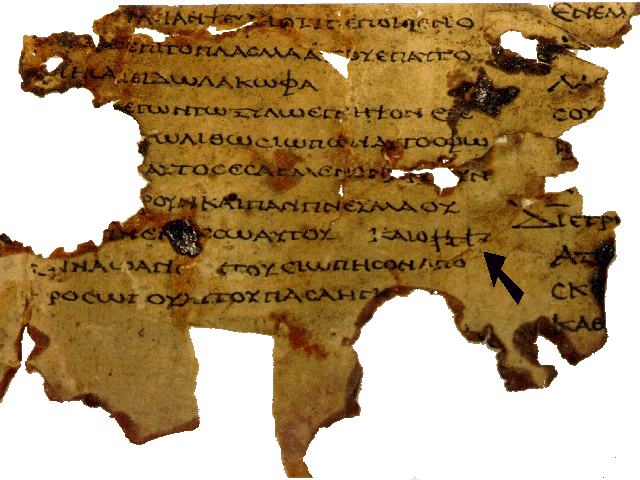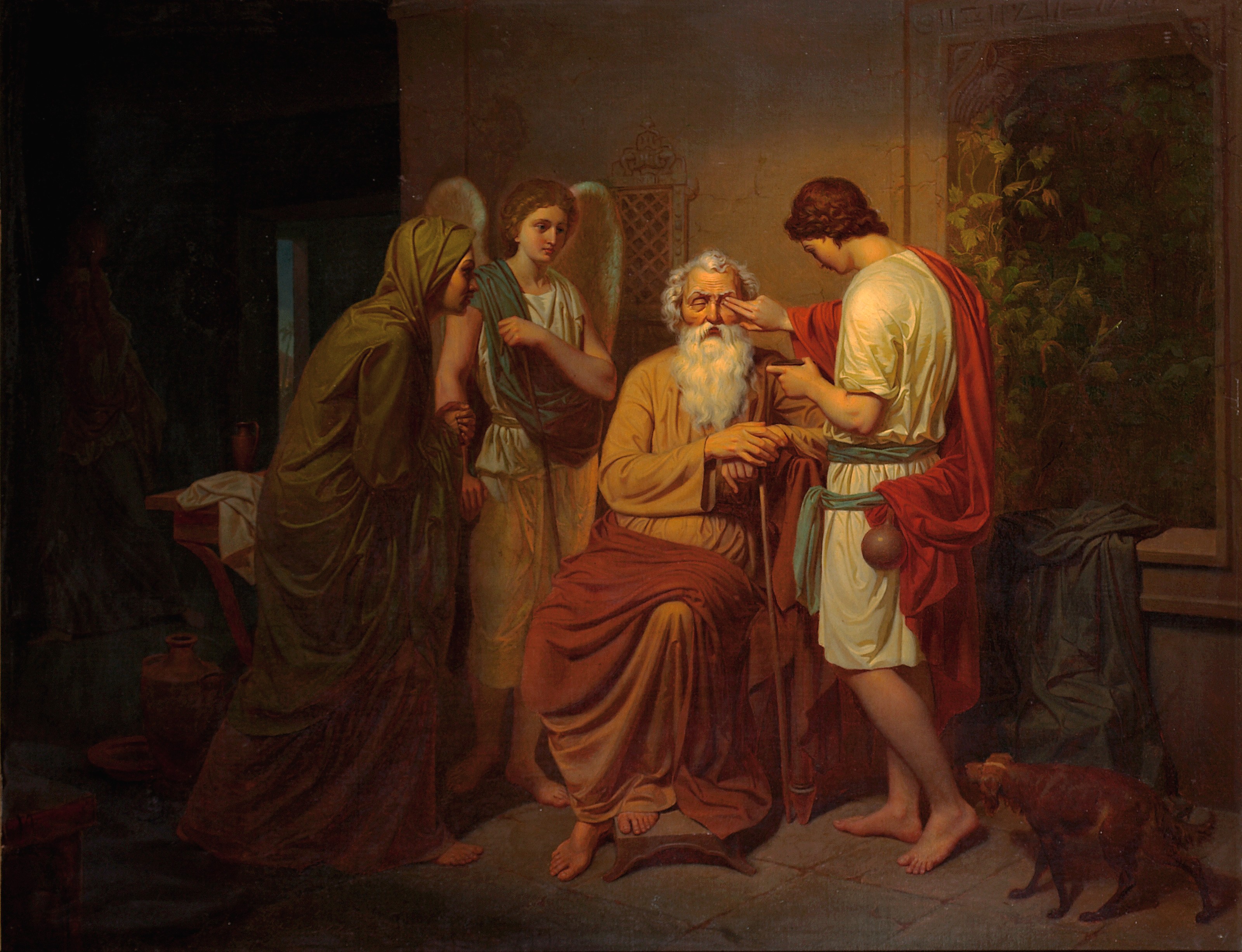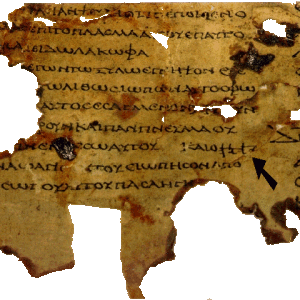 |
| Fragment of the LXX |
A reader e-mailed to ask about the use of the Septuagint (or LXX), the Greek version of the Old Testament used by the Jews at the time of Christ, and by the early Christians. This reader had encountered Protestants claiming that while the early Church used the LXX, this didn’t include the Deuterocanon.
The problem with this claim is that we have copies of the LXX, and it includes the Deuterocanon. We also have a wide corpus of testimony from the early Church regarding the use of the Deuterocanon. Let’s start with R. Timothy McLay, who addresses the difference between the Hebrew and the Greek Old Testament in his book The Use of the Septuagint in New Testament Research:
The number and content of the Jewish Scriptures that were later deemed as canonical are different in the two traditions. For example, the Protestant tradition is dependent upon the HB [Hebrew Bible] and counts the number of Old Testament books as thirty-nine, though the number of books in the HB is twenty-four: five of the Law, nine Prophets (1 and 2 Samuel and Kings count as one; Twelve Minor Prophets count as one), and eleven Writings (1 and 2 Chronicles count as one), while the LXX has fifty-three. We only have to compare the books that are contained in the Hebrew canon with the LXX to see that the LXX has a greater number and that there are also differences in the order of the books. Note, for example, that the book of Daniel is ordered with the Writings in the Hebrew Scriptures, while it appears with the Prophets in the LXX.
Map of Greece, showing Berea in the upper-left corner. The differences that exist between the Hebrew and the Greek canons of Scripture, both of which were preserved by the Jewish community, indicate that it is potentially extremely important to decide what Scriptures were the intended subject of 2 Timothy 3:16. Given the fact that the NT, like the LXX, is written in Greek and that many of the citations of Scripture in the NT agree word for word with how the passage reads in Greek, it becomes all the more likely that the Greek Jewish Scriptures were a significant influence on the NT.
This gets to an important point. 2 Timothy 3:16 (originally written in Greek) affirms the Scriptures as God-breathed. And Acts 17:11 praises the (Greek) Bereans for their attentiveness to the Gospel and their daily examinations of (Old Testament) Scriptures.
Origen (184/185 – 253/254) In answer to this, I have to tell you what it behooves us to do in the cases not only of the History of Susanna, which is found in every Church of Christ in that Greek copy which the Greeks use, but is not in the Hebrew, or of the two other passages you mention at the end of the book containing the history of Bel and the Dragon, which likewise are not in the Hebrew copy of Daniel; but of thousands of other passages also which I found in many places when with my little strength I was collating the Hebrew copies with ours.
This makes it clear that, from a very early date, the Christians and Jews used a separate Old Testament canon, and that this was no secret. Origen then notes that both the LXX and the Theodotion translations have this longer version of Daniel:
Of the copies in my possession whose readings I gave, one follows the Seventy, and the other Theodotion; and just as the History of Susanna which you call a forgery is found in both, together with the passages at the end of Daniel, so they give also these passages, amounting, to make a rough guess, to more than two hundred verses.
Africanus doubts the Greek version of Daniel since it described some of the Jews in captivity as living in relative luxury. Origen points out that Africanus is relying on the Book of Tobit for support. Of course, Tobit (like Judith, and the Greek version of Daniel) was accepted by Christians, but not the Jews:
 |
| August Malmström, Tobias healing his Blind Father’s Eyes (19th c.) |
You raise another objection, which I give in your own words: “Moreover, how is it that they, who were captives among the Chaldeans, lost and won at play, thrown out unburied on the streets, as was prophesied of the former captivity, their sons torn from them to be eunuchs, and their daughters to be concubines, as had been prophesied; how is it that such could pass sentence of death, and that on the wife of their king Joakim, whom the king of the Babylonians had made partner of his throne? Them, if it was not this Joakim, but some other from the common people, whence had a captive such a mansion and spacious garden?”
Where you get your “lost and won at play,” and “thrown out unburied on the streets,” I know not, unless it is from Tobias; and Tobias (as also Judith), we ought to notice, the Jews do not use. They are not even found in the Hebrew Apocrypha, as I learned from the Jews themselves. However, since the Churches use Tobias, you must know that even in the captivity some of the captives were rich and well to do. Tobias himself says, “Because I remembered God with all my heart; and the Most High gave me grace and beauty in the eyes of Nemessarus, and I was his purveyor; and I went into Media, and left in trust with Gabael, the brother of Gabrias, at Ragi, a city of Media, ten talents of silver.”
Origen’s testimony is hardly unique (I quoted St. Augustine on the authenticity of the Deuterocanon yesterday). But what makes his testimony so valuable is that:
- Origen is a scholar and a translator,
- he actually owns multiple translations of Scripture,
- he’s writing at a very early date, in the first half of the 200s,
- he’s describing the inclusion of the longer version of Daniel in every Christian copy of the Greek Old Testament, and
- he’s testifying to the common practices of the Christian churches, rather than simply his own opinion. That is, this wasn’t simply a Book he thought should be in Scripture, or a Book included for edification: these were Books used in church, everywhere.



You are awesome.
” R . Timothy McLay is an
independent scholar currently
residing in Toronto . He has served as
Associate Professor of Religious
Studies , Languages , and Ministry
Studies at St. Stephen‘ s University, St.
Stephen, New Brunswick . He earned
his B . A . at Atlantic Baptist University,
M. Div . at Acadia, and Ph. D . at
Durham .”
I’ve got a PDF thats the LXX interlinear with Strong’s numbering. Protestant Canon only though 🙁
It did. For some more evidence.
http://www.scripturecatholic.com/deuterocanon.html
It shows where the New Testament authors quote from the Deuterocannon, as well as MANY other quotes from the first 8 centuries of Church Fathers who quoted from the Deuterocannon.
Although I would prefer it if they included those quotes in their original languages of Greek and Latin alongside their English translations myself for better understanding…
But I digress.
If the Deuterocannon was good enough for St. Paul, then it’s good enough for me.
Great post on the canon as usual, Joe. BTW, have you done one on the Orthodox canon (why they have extra books?) You’re my go to source for arguments on this subject. Thanks.
Considering the enormous time and cost involved in translating books, I have a hard time believing that the 70(2) rabbis wasted their time on so many non-inspired texts.
Joe,
The one attempted rebuttal I have heard is that, since the Septuagint was not a fixed collection itself in the decades and centuries prior to Christ, it is difficult to know which books exactly were included in the Septuagint during that time. So it is possible that some or all of the deuterocanonical books were not included in it but then added “later”–whether before Christ or after Christ. Hence appealing to “the” Septuagint used by Christ and the Apostles does not necessarily mean that the Septuagint in their day included the deuterocanonicals.
Devin:
The problem with arguments like that, it seems to me, is that it implies that Catholics’ use of the deuterocanon is illegitimate unless they can establish its inspiration deductively or self-evidently. But this is not so. Catholics acknowledge an interpreter of the tradition to tell them what is part of the deposit of faith and what is not. Therefore, even if the evidence for the deuterocanon is muddled and we can only establish its canonicity through ampliative reasoning, this is not a valid objection.
In other words, the usefulness of arguments such as the one in this post is to show that you cannot establish the NON-canonicity of the deuterocanon beyond a reasonable doubt. And if that’s true–if the canon is not self-evident–Protestants have a big problem on their hands.
But for them to turn around and say “hey, you have the same problem in the other direction” is incorrect. We acknowledge that the issue can be complicated and have a magisterium to clear such things up when such clarity is necessitated. Am I right?
Robert, yes I think you are right. The muddy-ness of the canon, historically speaking, poses a far greater problem for Protestantism than it does for Catholicism, for the reasons you mentioned.
I think that it’s important to remember that Judaism at the time of Jesus, and long thereafter, was certainly not monolithic. Ptolemy’s effort was aimed at establishing an agreed-upon canon since there were various versions of scripture among the sects. The Pentateuch was the only more-or-less solid core.
You said “The problem with this claim is that we have copies of the LXX, and it includes the Deuterocanon.”.
What is the oldest copy of the LXX that includes the Deuterocanon?